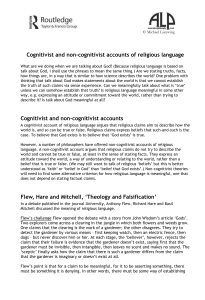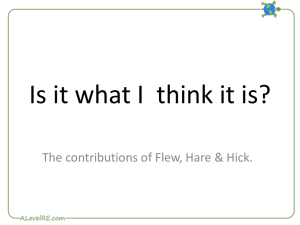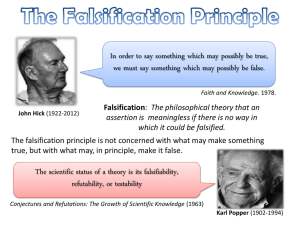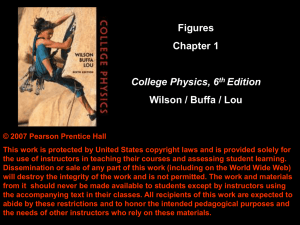Anthony Flew and A. J. Ayer - The Richmond Philosophy Pages
advertisement
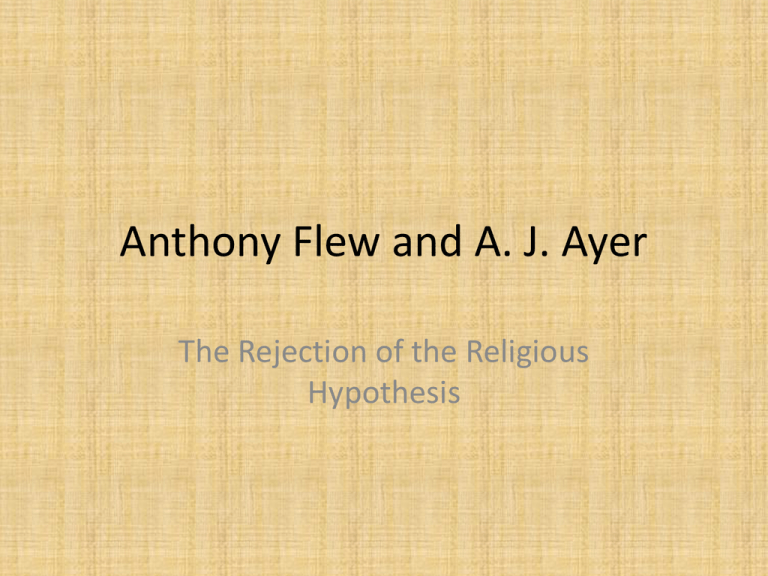
Anthony Flew and A. J. Ayer The Rejection of the Religious Hypothesis The Verification Principle • A.J. Ayer argued for a strictly empirical understanding of what was ‘meaningful’ • In other words, if a statement cannot be shown to be true (either by definition or by observations of the world), and we can’t imagine any circumstances under which it might be shown to be true, then it is meaningless • The religious hypothesis (that God exists) clearly falls into this category because it is about something transcendent and refers to objects which lie beyond human experience (God, heaven, life after death etc.) There are no experiments we could carry out, or observations we could make, which prove them, and o such statements are not meaningful • This idea put forward by Ayer is known as the VERIFICATION PRINCIPLE • What do you think of the verification principle? Falsification • Given the problems of the Verification Principle philosophers have moved away from verification as a way to attack theologians • Flew revives the attack on the meaninglessness of religious language by borrowing the gardener parable from John Wisdom, and adapting it to make his case • In Flew’s reworking of the parable, the 2 people spend some days in the garden. • Anthony Flew used Wisdom’s parable to draw the conclusion that religious claims about the world are not only unverifiable (as Wisdom acknowledged), they are also unfalsifiable • For Flew this means that religious claims are meaningless and they tell us nothing about the world Unlike in Wisdom’s parable, Flew’s sceptic regards the claim that there is a gardener as a hypothesis that needs to be tested. Since they do not observe any gardener visiting the garden, the sceptic reckons there must be no gardener. However, his companion, rather than giving up their belief that there is a gardener, concludes that one must come at night. So the 2 of them stay up all night keeping vigil, hoping to spot the mysterious gardener, but none appears. Again the sceptic takes this as evidence that there is no gardener, but the believer stubbornly responds that the gardener must be invisible. So they put up an electric fence around the garden and guard it with sniffer dogs, but still they find no evidence of a gardener sneaking in to tend the land. Despite this the believer continues to maintain that there is a gardener, but now claims he is not only invisible, but also odourless and intangible, which accounts for why they have been so far unable to find direct evidence of his activity. Eventually the sceptic despairs and asks the believer ‘how does your claim that there is an invisible, odourless, intangible gardener differ from the claim that there is no gardener at all? Because the believer holds on to the belief that there is a gardener, despite the failure to see one, they have shown that no evidence at all will make them surrender their belief. Each time their effort to find the gardener fails, the believer simply modifies their belief so that it isn’t falsified. Thus their belief is effectively unfalsifiable. • In Flew and Wisdom’s Parables what do the following represent? – The garden – The flowerbed – The weeds – The differences in belief between the two people in the garden? Flew’s Falsification Theory • Flew is arguing that a statement such as ‘there is a gardener’ is only meaningful if it is a genuine claim about the world • But it is only a genuine claim if the person making the statement can imagine being wrong – if there is a possibility of the statement being falsified • This is because someone who refuses to give up their belief, no matter what is discovered about the world, is not really talking about the world at all • When presented with evidence showing that their statement is false, they add to and qualify it so that the new evidence no longer refutes it – they move the goal posts to accommodate the new evidence • An example of how this happens with the religious hypothesis is the Biblical story about creation • Traditionally, Christians believed it to be literally true that God created the universe in 6 days, and that he created humans out of earth • Modern cosmology and evolutionary theory have cast serious doubts on such claims, and now most theists have qualified their belief in God so that it can accommodate such scientific advances. Instead of saying the fact that humans evolved from other life forms shows that God doesn’t really exist, they have qualified their beliefs. They now say that God created humans by using evolution in the modified form proposed by intelligent design theory • Flew thinks this is wrong. He thought if someone qualifies their beliefs in the light of new evidence to avoid having to give it up, then one’s belief suffers what Flew calls ‘death by a thousand qualifications’ • Through constant qualification and amendment the original statement is shown to be unfalsifiable and therefore it is not about the world and according to Flew is not meaningful • What do you think of falsification theory?


